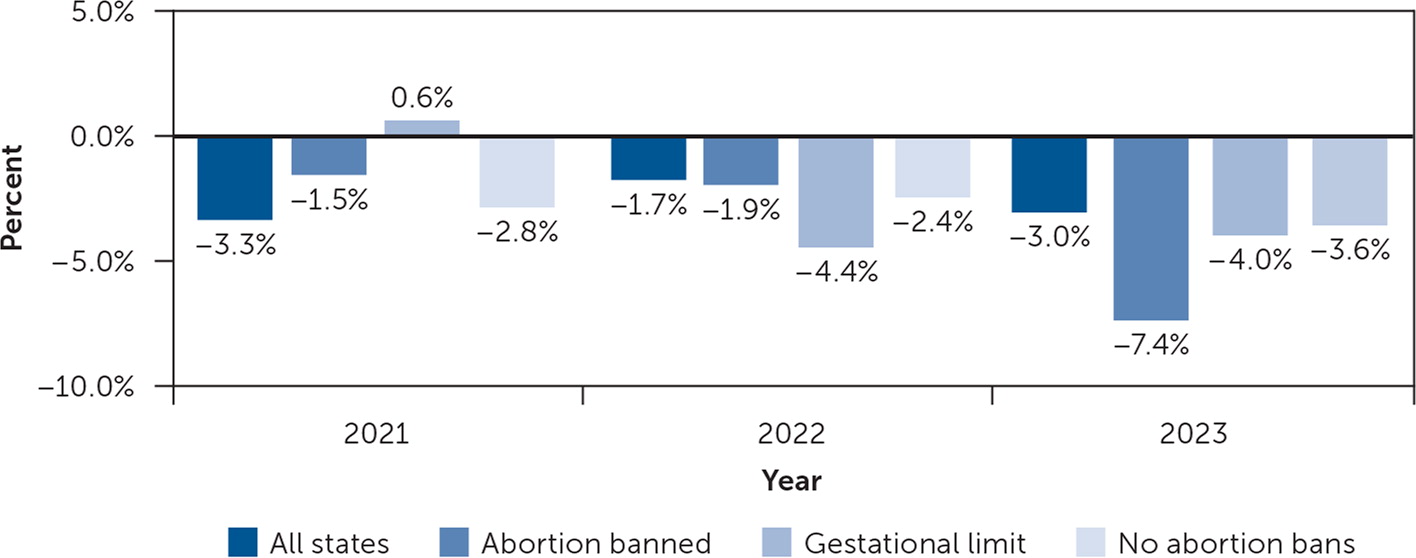
Am Fam Physician. 2023;108(2):132-133
Author disclosure: No relevant financial relationships.
Family medicine residency applicants desire a robust curriculum when selecting a residency training location.1 Residency curricula are required to include family planning and counseling in pregnancy,2 and may include abortion training.3 State legislative efforts that restrict the patient-physician relationship and prevent discussions concerning the full scope of reproductive care have an impact on residency applications.4 In 2023, the number of senior medical students applying for family medicine residencies declined by 7.4% in states with abortion bans compared with a 3.6% decrease in states where abortion is legal (Figure 15).

Since the Dobbs v Jackson Supreme Court decision in June 2022, many states have enacted rigorous abortion restrictions or outright bans.6 Patients face restrictions in abortion care, and many physicians are uncertain about the legal status of reproductive care and pregnancy counseling in their state.7 Abortion restrictions also have implications for the training of medical residents, particularly obstetrics and gynecology (OB/GYN) residents, as well as family medicine residents whose training includes abortion care. State legislative restrictions may impact a resident's ability to obtain the desired scope of reproductive care training.
A recent Association of American Medical Colleges (AAMC) Research and Action Institute study of applicants to OB/GYN residency programs found that there was a 10.5% decrease in applicants in states banning abortion in the 2023 application cycle, compared with 5.3% decrease in applicants in states where abortion remains legal.4 Given the change in the number of OB/GYN residency applicants in states with abortion bans, the current analysis evaluated the change in family medicine residency applicants in states with a gestational limit on abortion or an abortion ban.
We used Electronic Residency Application Service data from the AAMC from 2021 to 2023 on family medicine residency applicants. These data were used to highlight changes in the number of applicants across states, with and without abortion bans.5,8 Abortion restrictiveness is defined by the Kaiser Family Foundation as abortion banned, abortion legal beyond 22 weeks from last menstrual period, or gestational limit between 15 and 22 weeks.8 The impact of the Dobbs decision may have begun to occur in 2022 because the opinion was rendered in late June; however, subsequent state restrictions on reproductive care likely exerted a greater effect on residency applicants in the following 12 to 24 months.
In the 2023 application cycle, there was an overall 3% decrease in family medicine residency applicants compared with the previous cycle. Figure 1 shows the change in percentage of family medicine residency applicants from 2021 through 2023, based on level of state abortion restriction.5 There was a larger decrease in the applicant pool for family medicine residencies in abortion restrictive states. In 2022, there was a large decrease in applicants to programs with a gestational limit and a smaller decrease in states where abortion was banned. In 2023, there was an even larger decrease of 7.4% in family medicine residency applicants to states with complete abortion bans and a 4% decrease in states with a gestational limit on abortions.
A possible interpretation of the data is that state legislation that interferes with the patient-physician relationship and criminalizes abortion care is associated with lower interest in residents pursuing family medicine training. Many factors impact a residency applicant's decision to apply to residency and the scope of training available likely has an influence.1
